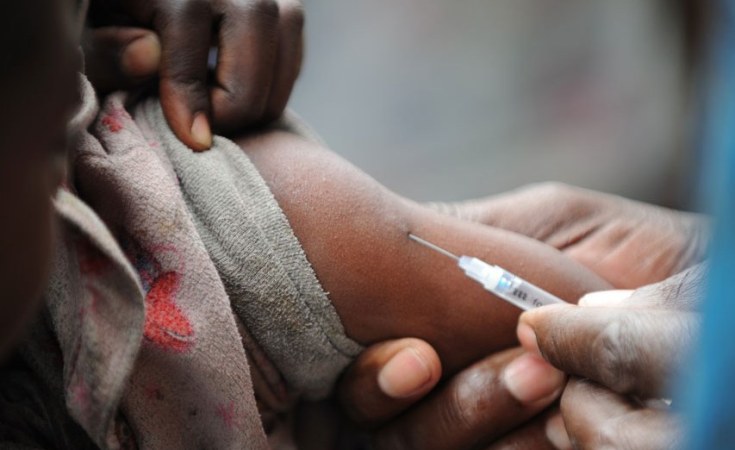Imagine a disease more infectious than any other known to medical science, that would kill 2.6 million young children every year and leave millions more with deafness and even brain damage. It sounds like something from pandemic horror fiction, but such a disease does exist - measles.
Yet even measles was tamed across the world, at least for a while. In the aftermath of the successful eradication of smallpox in the 1970s, a similar global vaccination effort crushed measles mortality from 2.6 million in 1980 down to 73,000 by 2014.
Measles' R number (the average number of people someone with the virus will go on to infect) of 15 or more puts even the most rampant variants of SARS-CoV-2 in the shade. Because of this infectiousness, it's never been quite possible to achieve eradication, but many countries have been declared measles-free by the World Health Organization.
This achievement isn't necessarily permanent, however. The UK was deemed measles-free in 2016 but lost its status just two years later. And now there are rising case numbers across England, with significant outbreaks in London and the west Midlands.
The principal weapon in the war against measles has been the MMR vaccine, rolled out from 1971, which also provides immunity against mumps and rubella - two other viruses with potentially nasty long-term effects.
MMR's global deployment was perhaps the greatest public health triumph of the last quarter of the 20th century, saving at least 56 million lives by WHO estimates.
Until, in 1998, a spanner was thrown in the works when spurious claims were made in The Lancet about a connection between the MMR vaccine and autism. In 2010, the paper was retracted by the journal and its lead author, Andrew Wakefield, struck off from practising medicine in the UK. But by then, the damage had been done.
Despite numerous studies confirming both the efficacy and safety of MMR, and failing to find any connection whatsoever with autism, many people began to have second thoughts about bringing their children in for vaccination. Vaccine hesitancy had set in, and measles began its insidious return, with global deaths climbing to 136,000 in 2022.
Vaccine hesitancy and misinformation
Vaccine hesitancy, although nothing new, has become such a problem for public health services that it is the subject of intense research interest.
And it isn't just scare stories about autism. Studies have revealed the full complexity of the problem - that there is no single factor which vaccine-hesitant people share, and therefore no obvious, easy public educational strategy to solve the problem.
Those who are less educated have a tendency to hesitancy - but so do those who are highly educationally qualified. Likewise, those who hold deep religious convictions but also those who are militantly anti-religious, those who distrust the nanny state, those who distrust capitalism and particularly the pharmaceuticals industry, the poorest in society and the richest - all these groups show elevated levels of vaccine hesitancy, yet often have little else in common at all.
In contrast, a middle-of-the-road, middle-income, reasonably educated person with weakly held religious beliefs is the most likely to be found in the queue at the vaccination station. We still do not really know why.
Vaccine hesitancy is now a problem for all vaccination programmes but particularly measles, since its R of 15 or more means that any drop in vaccine coverage will result in a rapid increase in cases.
Where vaccine coverage becomes locally low, there can be local epidemics of considerable severity. Many countries have now lost their hard-earned measles-free status, in Europe including Albania, the Czech Republic and Greece, as well as the UK.
But there is one thing we can all do to help - and if you live in the UK, the NHS can help you do it.
MMR is not just for kids
Even if an adult has received MMR as a child or survived an attack of measles in the pre-vaccination days, their immunity can wane. Although the risk of a second attack bad enough to produce the symptoms seen in unprotected children is very small, adult MMR is still worthwhile as it goes beyond just protecting the person who receives the vaccination.
By bolstering the immunity of adults against these three viruses, it decreases the likelihood of an asymptomatic infection and prevents an adult becoming an unwitting carrier. Adult MMR can help to restore some of the herd immunity that has been lost due to vaccine hesitancy.
Babies under a year of age cannot receive MMR, so they are the most vulnerable. Opting for adult MMR helps protect those babies from measles, and it helps prevent rubella in pregnant women and their babies.
And if you're a man of a certain age, opting for adult MMR also protects you personally against orchitis - the dreaded inflammation of the testicles that is a symptom of mature men's mumps.
It would be a tragedy for the world to return to the days of uncontrolled measles epidemics due to sustained vaccine hesitancy over MMR. Let's get herd immunity against measles back up to where it should be by choosing adult MMR.
Derek Gatherer, Lecturer, Biomedical and Life Sciences, Lancaster University


